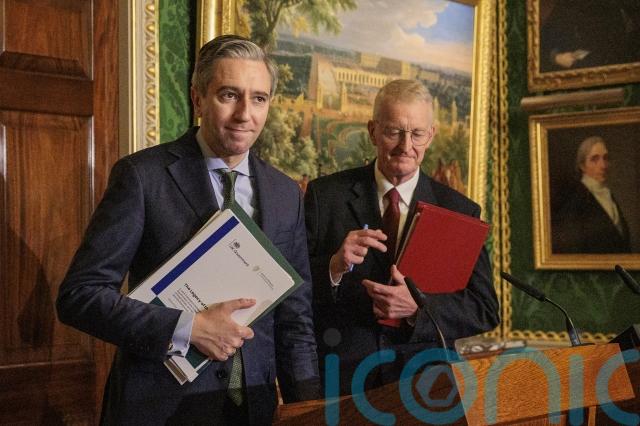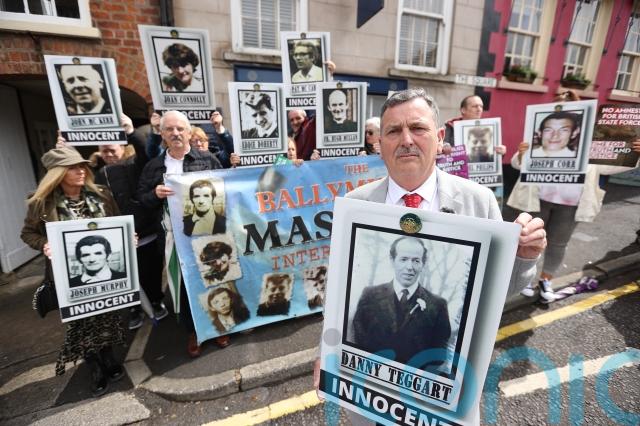
A new deal to address the legacy of Northern Ireland’s past agreed by the UK and Irish governments will have a lot of questions to answer, victims have said.
The two governments were also warned by Amnesty International that the new framework must be “more than simply a rebrand”.
Meanwhile, Philip Barden, of legal firm Devonshires, which has represented hundreds of former soldiers in probes, welcomed commitments of co-operation by the Irish Government but said it is “ultimately more of the same” and “one-sided”.

The accord, unveiled by Secretary of State Hilary Benn and Tanaiste Simon Harris, includes commitments to resume legacy-related civil cases and some inquests, and restructure the Independent Commission for Reconciliation and Information Recovery (ICRIR).
Belfast legal firm KRW Law said it will have an “immediate practical impact on hundreds of cases”.
They said while legislation is awaited, hope has been restored, and they will watch to see how the Irish Government “lives up to the promises”, adding “because on past history there’s little to inspire”.
“In Belfast we are now taking steps to resurrect previously stayed high court civil actions,” a KRW Law spokesperson said.
“The Legacy Act halted over 100 civil cases against state agencies ranging across three decades and all strata of the conflict.”
Two men whose loved ones were killed by British soldiers in Belfast and Londonderry in the early 1970s said the framework has to answer a lot of questions.
Mickey McKinney, whose brother William was among those killed in Londonderry in the Bloody Sunday shootings in 1972, and John Teggart, whose father Danny was among those killed in Ballymurphy in 1971, said they had both fought long and difficult battles for justice.

They were speaking outside Belfast Crown Court following day four of the trial of a former paratrooper known as Soldier F who has been charged with two counts of murder on Bloody Sunday.
Mr McKinney said the UK Government is not trusted by victims.
Mr Teggart said just that day the soldier F trial had been under way at Belfast Crown Court while a case involving the Glenanne Gang, whose membership included rogue members of the security forces, was under way at the High Court.
Referring to former police officers being among investigators involved with the ICRIR, set up by the previous government’s Legacy Act, Mr Teggart said there is distrust among victims.
“There are a lot of questions to be answered, but the thing is, it’s confidence,” he said.
“We haven’t read the document yet, it’s all down to what is in the document, what changes.
“We campaigned for the ICRIR to be binned so it’ll take a lot of encouragement.
“We’re not going to be negative because we haven’t read it, but the people within the victims sector are no fools, so we’ll see what is in it, and we’ll decide if people like ourselves can support it.”
Grainne Teggart, Amnesty International’s deputy director for Northern Ireland, said they will examine the framework to assess whether it fully complies with the European Convention on Human Rights and can genuinely deliver for victims.
“Root-and-branch reform of legacy mechanisms must be more than a rebrand. Victims have been clear: they will not accept half-measures,” she said.
“Any process must put rights at the centre and deliver truth and accountability, not erase them.
“The detail in forthcoming legislation will be critical to determining whether this framework is meaningful.
“Amnesty has long called for the Legacy Act to be replaced with a process that builds on the Stormont House Agreement, has the confidence and participation of victims, and meets human rights standards.
“This framework and subsequent legislation must meet those tests and be changed or rejected if they fail them.”
Daniel Holder, director of the Committee on the Administration of Justice (CAJ), also said they intend to scrutinise the proposals carefully.
“Trust is already at rock bottom due to the intention behind, and failure of, the Legacy Act and its ICRIR institution,” he said.
“This makes building confidence in families in a reformed and distinct legacy commission all the more challenging.
“It is nevertheless essential that families do have a viable legacy mechanism for what are long overdue investigations.”
Mr Barden claimed the UK Government is “clinging to a flawed approach”.
“We’ve seen again and again that this approach is hamstrung by the simple fact that most of the murders were committed by terrorists, on either side of the divide, and paramilitaries and their associates simply will not co-operate in the search for truth,” he said.
“The truth will only come from everyone agreeing to say what they know, otherwise the one-eyed system will continue.
“The protections for veterans are welcome, but scratch a little deeper and these are ultimately those that already exist.
“What the veterans want, and what would provide real protection, is to ensure that any matter at hand will be closed when alleged terrorists refuse to co-operate. Justice and truth cannot be one-sided.”
Subscribe or register today to discover more from DonegalLive.ie
Buy the e-paper of the Donegal Democrat, Donegal People's Press, Donegal Post and Inish Times here for instant access to Donegal's premier news titles.
Keep up with the latest news from Donegal with our daily newsletter featuring the most important stories of the day delivered to your inbox every evening at 5pm.